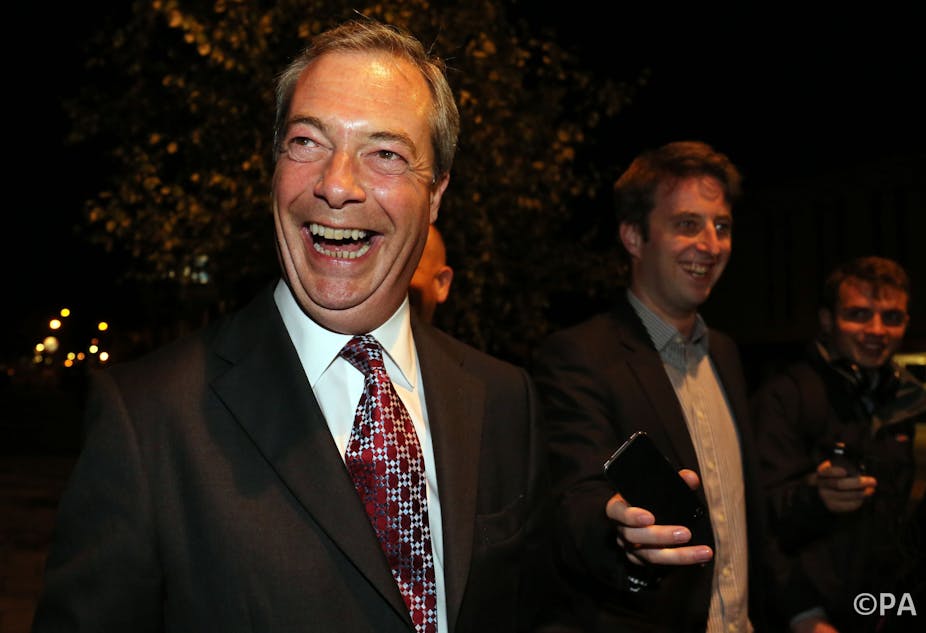An important milestone for political junkies is fast approaching: on Friday November 7 it will be six months to go until next year’s UK general election. At this stage it looks almost impossible to call, with both Labour and the Conservatives struggling to build any momentum. And with the Liberal Democrats seemingly heading for an iceberg, only Nigel Farage and the Scottish nationalists seem to have anything to smile about.
In the run-up to the Scottish referendum I wrote several pieces for The Conversation analysing the betting patterns on Yes and No. We now know that the bookies successfully predicted the result and gave useful pointers to geographical voting at an earlier stage than many of the analysts. Will the same be true of the UK election? This is the first of several articles that will monitor how the odds develop as we get nearer to May 7.
Current betting
There is not much between Labour and Conservative at this point. According to the average odds of more than 20 bookmakers, Labour’s odds have been improving lately and the Conservatives’ have been moving slightly out. UKIP has been the biggest mover, shifting from 44/1 to 40/1 in a week, while the Liberal Democrat vote has drifted out to 308/1. Some bookies are offering 1000/1 on a Lib Dem win, which is not even odds you would see in FA Cup betting.

One of the key questions is whether there will be a majority. According to the average odds, no overall majority is the most likely at this stage (10/11). The prospect of a Labour majority is sitting at around 2/1, which the bookies think more likely than the Conservative equivalent (10/3).
As for coalition prospects, Lab-Lib is the most likely at 4/1. A repeat of the Con-Lib coalition is priced at 11/2. The chances of a minority Labour or Conservative government are at about 7/1 apiece, with the Conservatives currently slightly ahead. As for a Con-UKIP coalition, it is at more than 11/1.
Those with money to burn might like to mull the more distant possibilities. A Con-Lab coalition is at 50/1, more likely than a Lab-UKIP coalition (66/1) or even Lab-SNP (100/1).
If we look at Labour’s odds over the past few months, there is very little change. They have sat in a band between 3/5 and 4/5, which you would expect at this relatively early stage of the campaign because you get fewer big bets that would disrupt them. Far more lively have been the UKIP odds. The figures show that there is no real consensus for what their vote will be, with the range for an election victory between 25/1 (888.com) to 66/1 (Betway).
The finer points
One of the big questions for Labour is whether its Scottish vote holds up. There has been much talk that it will collapse on the back of their support for the No vote in the referendum as working class voters desert them for partnering with the Tories.
The bookies are currently predicting between 13 and 14 seats for SNP – it currently has six. As recently as April they were predicting just one or two gains. Since the referendum in September, the prediction has risen by five seats.
This is a bigger jump than UKIP or the Lib Dems over the same period. Since August the UKIP forecast has risen from three seats to six, while for the Lib Dems it has dropped since July from 34 to 31. Meanwhile Labour is forecast 306 seats and the Conservatives 276, which would mean that Labour would need to form a coalition with the Lib Dems to secure a majority. As for the Greens, they are an even bet to win a seat.

On the question of who becomes the next prime minister it is nearly neck and neck between the two main contenders, with Ed Miliband at 4/5 and David Cameron at evens. Boris Johnson comes in ahead of the rest of the pack at 23/3. Some way behind are Theresa May and Yvette Cooper. An alternative is to bet on the next PM being any female, which is priced at 5/1 (compared to 1/10 for a male PM).

Finally on the Europe question, the bookies seem to be predicting that the move towards UKIP and pulling out of the EU is a short-term blip. At present the odds are 3/1 on the UK leaving the EU by 2020. But beware: the chances were priced at 8/1 in May, so like UKIP’s prospects, this question is still very much in flux.
What does all this tell us? Labour is still in front despite all the anti-Miliband coverage. The Lib Dem collapse and the UKIP surge may be less marked than some people have been predicting, but the prediction of an increase for SNP seems on-track with bookies, with a doubling of seats predicted since the referendum. Whether this feels reassuring or disappointing, watch this space to see how the figures change in the months ahead. The bookies make their money on providing attractive odds, but are continually appraising a range of indicators.

